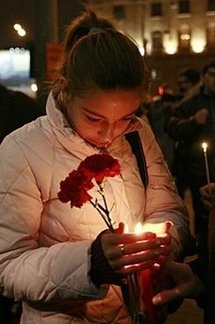Russian state TV slammed for tardy coverage of blasts
Marina Lapenkova
MOSCOW, Marina Lapenkova - Russian media Tuesday sharply criticized state television for its tardy coverage of the Moscow metro suicide bombings, after channels took up to three hours to report news of the attacks.
While news agencies and radio stations broke the news 20 minutes after the first explosion at Lubyanka metro station at 7:56 a.m., none of the three main television channels interrupted their schedules for rolling news coverage.

"For an hour, the Russian channels barely reported anything about the explosions in the metro," the independent daily Kommersant complained Tuesday.
Channel One and Rossiya channels, the country's most watched, did not interrupt their normal schedules, although they briefly mentioned the news from 8:30 onwards.
The country's third most watched channel, NTV, did not mention the blasts until its 10 a.m. news broadcast.
Russian satellite news channel Russia Today, an English-language outlet aimed at viewers outside of Russia, and the Russia-24 cable news channel began following the story promptly, however.
Russia Today "initially won in timeliness even over radio stations," Kommersant reported. The channel's headquarters are located across the road from Park Kultury metro station, where the second blast took place.
As national media scrambled to react to the news, Internet resources provided some of the strongest coverage.
Once its coverage began, Channel One broadcast shocking cell phone footage of wounded victims in a smoke-filled metro station on its main evening news broadcast. The footage came from the sensationalist Life.ru news site.
"It's not the Kremlin which censors the channels, but the channels themselves," said Anna Kachkayeva, a television critic and teacher at Moscow State University's journalism school.
"Self-censorship is instinctive to those who have worked for television for a decade," Kachkayeva told AFP.
The Kremlin, during two terms under strongman Vladimir Putin from 2000 to 2008, leaned heavily on national television networks, particularly regarding coverage of sensitive domestic security stories.
State channels have since been expected to toe the official line and even private networks with national reach have been pressured to the point of changes in ownership to more Kremlin-compliant business figures.
Independent channel NTV was taken over by the state in 2003 after the Kremlin criticized its no-holds-barred coverage of the Dubrovka theatre hostage crisis in 2002, in which 130 people died.
NTV broadcast images of security forces preparing to seize the building and invited parents of hostages to a talk show. The channel was slammed by then-president Putin for "looking for an audience using blood."
Kremlin pressure on big media has not been confined to television.
In 2004, the editor of daily broadsheet Izvestia was sacked after the newspaper printed hard-hitting images of the Beslan hostage crisis, including a full-page photograph of a rescuer carrying out a schoolgirl.
-----------------------------------------------------------------------------